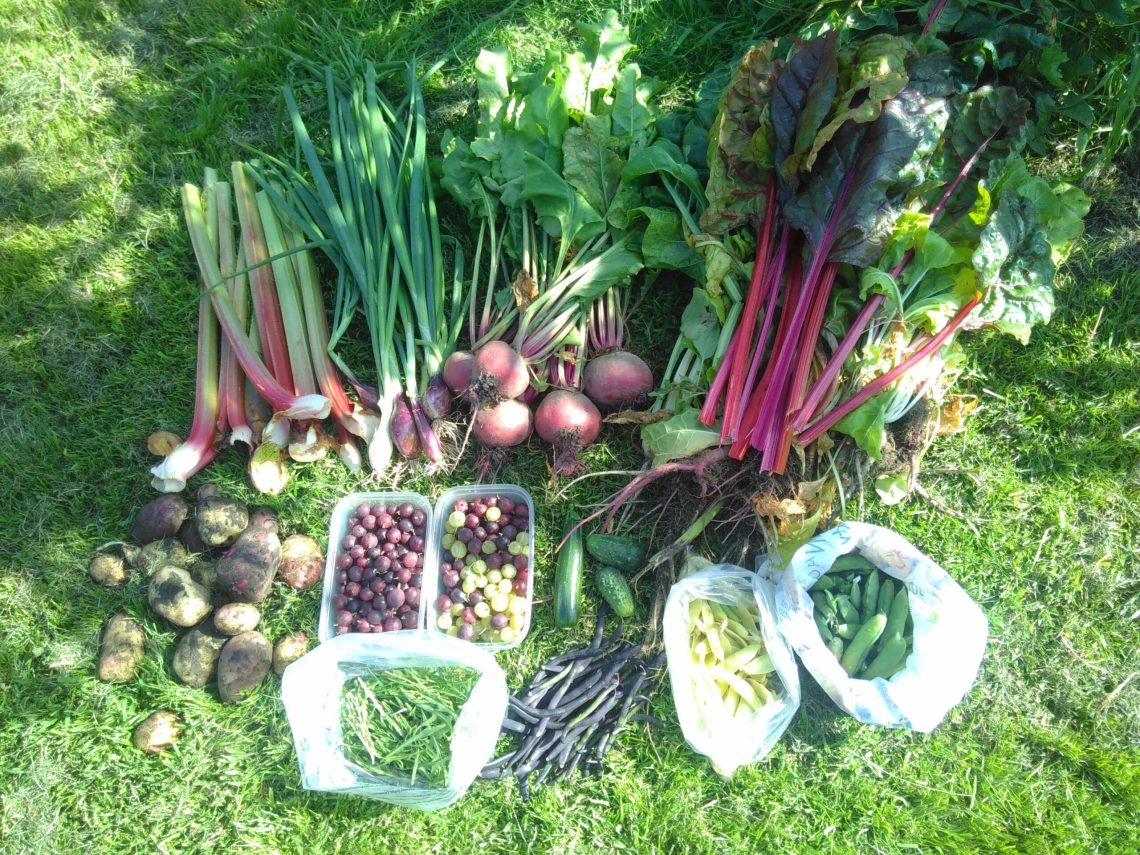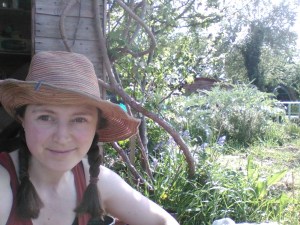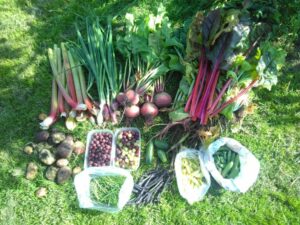
Part 2 MARK STATMAN: MEXICO AND THE POETRY OF GRIEF AND CELEBRATION
Part 2 of my interview with Mark Statman looks closely at Mark’s Latin American poetic influences, his life in Mexico and ends with an extract


I interviewed Tamara Evans Braun about her efforts to limit her impact on the planet, which she discusses on her website ASPIRING GREENER. Tamara, who lives in Bristol, says about herself: “I am a grower, writer, organiser, wanderer, campaigner and mother. I was a scientist for a while but it’s nicer outside.”
Leslie: How has living in Bristol and your past as a scientist shaped your thinking?
Tamara: Bristol is an amazing city. It’s massively diverse and vibrant, a city of people of who stand up for what they believe in, both now and historically. It’s hard not to get sucked into that energy for change, and to be honest why resist such a good thing! So yes, I’m inspired by this place, by it’s energy and community, by it’s friendly people. I’ve been here 10 years now and its the place I’ve lived longest in my life so it feels like home.
As anyone who follows Bristol politics will know, only the Green Party and Labour really get a look in, which is nice! I’m aware I live in a bit of a left wing, eco-friendly bubble. I think its important to remember bubbles don’t necessarily reflect the state of the world. But in a way it’s good because it keeps me optimistic and makes living sustainably easier- from a super active Green Party to get involved with, to climate protests an easy bus ride away, to a corner shop that sells oat milk! When lots of people around you are concerned with green issues, it becomes easier to do it yourself.
For a long time my main campaign focus was human rights and it took me longer than I am proud of to see that climate change was deeply connected to human rights. But it is, in such a major way and the green community here definitely helped me see what a pressing issue climate change is.
One final thing about Bristol: It’s always making me think and question my views. Despite my bubble, after each happening or protest the breadth of local opinions is massive and makes me really reflect on what I think. I feel like I’m open-minded and progressive but then a statue gets toppled, a friend undergoes gender transition, people riot and I realise however supportive I want to be, I can still always be more educated and keep listening.
Maybe that desire to learn is what made me want to do science. In terms of being a scientist, I wasn’t a great one. I realised part way through my PhD that I hated paying attention to detail, being meticulous or doing anything repetitive. I then worked in science e-learning though, which I was good as it broadened my world again. As a researcher you end up getting very specialised, an expert but in another bubble I suppose.
I do think my science background helps me analyse things rationally and always ask questions. Climate activism is based on science. It’s science that explains the environmental phenomenons we see and even more importantly, how to change our course. It’s really good to be able to understand the science behind things and explain it to people who don’t find an academic paper accessible!
Leslie: Can you tell us about Greenbank Pottery – why you wanted to start it up, how you learned to do it and how the business began, grew and developed.

Tamara: Pottery has been a long term hobby of mine, I did classes as a child but my real enthusiasm arose from another really geeky hobby. I do tudor re-enactments at a beautiful place called Kentwell Hall in Suffolk. I’ve been doing them since I was three, so growing up I thought it was perfectly normal to wear Tudor clothes and demonstrate historic crafts to visiting public. Apparently it’s not very normal. But it is very fun. And that was where I learnt to throw pots. On a wonky wheel, in a wood while pretending to 30 school children that I was a master of my trade. We fire in a wood-fired kiln for roughly 12 hour: an exhausting but invigorating process.
In the real world, I did pottery classes at various places until one day my parents said their neighbours were tearing down their old conservatory and from there the idea of building my own studio in our garden was born. Some wonderful friends helped and with a load of scrap wood from the amazing Bristol Wood Recycling Project we built a pottery shed. Everything in it has been aquired from friends or is cobbled together, out of castoffs. Perhaps a bit too much actually- the roof needs some love before winter!
After being built the studio didn’t actually get used for ages. I found out I was pregnant and, following a traumatic birth and a very screamy not-sleepy baby, everything got put on hold for several years.
People don’t really talk about the bad bits of parenting and I had no idea quite how tough it could be. My son is amazing and I love him so much but it has been a journey to get to this point and I still have a lot of recovering to do. So it’s from the mess that I was left in that Greenbank Pottery was born. As I regained some physical space and some headspace I realised I wanted to give doing pottery a proper go. In the past, my main motivation has usually been because I felt I should, or because I could contribute something useful. This venture feels very much for me. Which is actually very scary and feels horribly selfish. Anyway, I quit my job just before the pandemic and started making plans and getting the studio really up and running. And I’m doing it. Two days a week I do pottery.
It’s been frustratingly slow to get going and I am a person that struggles massively with motivation and distractions, so working for myself at home has been mega-challenging. But being creative is amazing and rewarding.
I’m still at the start but I’ve now developed a couple of lines and am starting to sell my work. Which is also intimidating because to me, even if I like a piece, everything I make looks totally amateur. I think maybe it always will and that’s just another thing to learn and accept.
One thing I am really keen on is making my pottery as sustainable as I can. I use rainwater from the studio roof and a kick wheel (powered by by leg rather than electricity). I also consider what I make and what materials I use. Clay is a natural resource, it comes from the ground and is plentiful!
Unlike Bristol airport however, I am not up for greenwashing! My set up isn’t carbon neutral and it’s very much a work in progress. Firing the pots, to turn them from clay to ceramic, takes a big chunk of energy that is unavoidable if you want to make functional tableware. I have a modern electric kiln for firing which is pretty efficient. I also single fire, which is where you do combined biscuit and glaze firing rather than firing the kiln twice which is more common in modern western pottery.
I am currently trying to work out the carbon footprint of one of my mugs but it’s a bit of a rabbit hole and my suppliers are currently not being forthcoming on their supply chains! In the meantime, my pots are designed to be useful and they should last. I’m sure you’ve seen Roman pottery in museums – if looked after a ceramic mug should last many lifetimes but if you ever wanted to you could grind it to dust and return it to the soil!
Leslie: How have you kept a low-carbon budget while touring? What have you had to adapt to, and what have been the rewards?
Tamara: I absolutely love to travel. I am not a still person, even at home I dart around! So travel for me feels very core to who I am, even though really the lowest carbon option would be just to stay put.
Locally to keep my impact low I cycle, walk, take a bus or a train. Our family doesn’t have a car, which we feel smug about. Actually we are massively lucky to be able to do this, we are able-bodied, work within cycling distance of our house, have bus routes close by and can afford a last-minute car rental if we need to go pick something up. Bristol’s public transport is awful though. Expensive and unreliable, it needs to be sorted out so people have a decent alternative to car travel.
Having said that, using active or public transport is also a mindset. Lots of journeys are unnecessary and once you have a car it’s so very easy to just pop to the shops in it!
Not having a car takes adapting to. The thing I am most jealous of is when friends just bundle stuff into the car and take off for a weekends camping. We always have an extra step of packing our backpacks and getting to the station. But really in the grand scheme of things that is far from hardship. Car-free ventures just need a bit more planning and also a lighter tent.
 Travelling further afield we go overland. Flying is such a massive polluter and we really try not to do it. Many people feel time pressured on their holidays but most of Europe can be accessed from the UK by train within 24 hours. I’m actually writing this from Ireland, where my parents live. Me and my 4 year old have come over by train and ferry for a long weekend. The journey feels epic but we take books, travel toys and plenty of snacks and in my opinion life is best when it involves an epic journey.
Travelling further afield we go overland. Flying is such a massive polluter and we really try not to do it. Many people feel time pressured on their holidays but most of Europe can be accessed from the UK by train within 24 hours. I’m actually writing this from Ireland, where my parents live. Me and my 4 year old have come over by train and ferry for a long weekend. The journey feels epic but we take books, travel toys and plenty of snacks and in my opinion life is best when it involves an epic journey.
Overland travel is another mindset thing. Travelling isn’t all about the destination, there’s a lot to see on the way. You can stop off at places, if you have more time, or just sit and read while you watch the world pass by (Maybe it’s because I have a four year old but the idea of just sitting down in peace for a whole day and reading sounds like heaven ). If reading isn’t your thing, write, watch tv, call your friends, play a game, meditate, whatever. Maybe all of them if It’s a very long journey or you are travelling with a family (which I highly recommend by the way!).
If carbon footprint alone isn’t enough of a motivator, overland travel is also very rewarding. A great thing about travelling by public transport is that normal people use it. If you are in a place because you want to experience it, then being in a confined moving space is a wonderful way of meeting people. I’ve shared picnics with Buddhist monks while bumbling across China. I’ve drunk vodka with strangers somewhere in Siberia. I’ve learned about people’s grandchildren in the depths of West Wales. I’ve discussed Brexit with an Orkney bus driver. Of course it’s fine to not talk to anyone if that’s not your thing.
The one downside that I can see of trains vs planes is the cost and I totally get why that’s prohibitive. But as with most ethical issues the cost of the cheap thing is still there, its just passed on. Air travel is massively subsidised and massively damaging to the world, it isn’t really that cheap. The government pays and the planet pays, so we all pay. But until subsidies and governments shift, there are deals to be had. Eurostar often have sales and if you just book ahead its not too bad. UK to Ireland there’s a deal called rail sail which you book through the trainline.
Finally just a quick note to say it’s not just the travel. When you are away from home it’s easy to let slide all the good habits you might have here. So for me, it’s about finding out about local recycling provision, trying to limit single use plastics (that’s often the hardest thing), not turning up the heating where you are staying, etc. A trip away can be a chance to relax but the ‘green’ stuff we should be trying to do at home still applies.
Leslie: What are the main problems with market-led, shop-bought clothes? How can we fix the present situation?
Tamara: It’s the same deal as I’ve just gone into with air travel. There’s this massive market of dirt-cheap clothes. Great on the surface for anyone who likes a bargain or who is strapped for cash but really bad if you look at the bigger picture. Again the costs are passed on. You have massive monocultures of cotton for example, grown using a shed loads of water and pesticides (massive co2 footprint in there). The crop is taken to factories where people are paid a utter pittance in appalling working conditions to make it into cloth and then into clothes. Big shops then sell them on, pushing out smaller local businesses who just can’t compete. So to answer the question and summarise that paragraph: massive environmental damage and human rights abuses.
To that I’m also going to add a massive dollop of waste. Fast fashion. Lots of clothes are bought as single-use items. It’s utterly crazy. Some are not even worn. It’s like spending hours cooking a fancy meal with expensive and exotic ingredients then just chucking it in the bin. The simple answer to that is just don’t!
In reality though these cheap cheap clothes are symptomatic of bigger issues. Global poverty and inequality means people will work in awful conditions to try and make ends meet. Poverty here necessitates people to buy the cheapest they can to clothe their kids. Our consumerist culture tells us we’ll feel a bit less empty if we just buy one more thing.
 The other bit of the question, I really haven’t fixed anything. We can all do little things; Try to shop second-hand wherever possible. Wear stuff as long as you can, wash it on cold. Mend it if it’s broken, pass it on to friends or back to charity if it’s not wanted. For new stuff, there’s loads of ‘ethical’ brands out there if you do have the money. Most have their values online and there’s lots of fabrics to choose from. Organic cotton seems to be a good bet as it’s way better for the environment than standard cotton.
The other bit of the question, I really haven’t fixed anything. We can all do little things; Try to shop second-hand wherever possible. Wear stuff as long as you can, wash it on cold. Mend it if it’s broken, pass it on to friends or back to charity if it’s not wanted. For new stuff, there’s loads of ‘ethical’ brands out there if you do have the money. Most have their values online and there’s lots of fabrics to choose from. Organic cotton seems to be a good bet as it’s way better for the environment than standard cotton.
Also follow the campaigns of organizations like labour behind the label.
Leslie: Can you tell us the story of your allotment – the setbacks & successes – what have been the health benefits?
Tamara: Ah, our lovely allotment. It’s both a joy and a constant source of stress to be honest! I’m ever-plagued by guilt of not doing enough and anywhere weeds grow is a very visual example of what happens when you let things slide! But in the end eating what you grow is so rewarding. You know what’s gone into it (sweat, tears, children’s laughter) and what hasn’t (pesticides, fertilizers etc).
We got our allotment 10 years ago, before everyone in east Bristol wanted one so there wasn’t even a waiting list. It was waist high bindweed and bramble. Clearing it caused the death of so many lifetime guarantee spades that I felt too guilty to keep taking them back
I picked up a selection of second hand gardening books and we just learned as we went. The first year, not wanting to waste anything we’d grown, we ate a lot of radish tops, which as books say are edible, they just aren’t very nice. Since then we’ve tried all manner of random vegetables and fruits and for a number of years we grew all our own veg (not including starches) and a load of fruit, which I recommend to anyone wanting low effort produce. Our not-put-downable baby slowed our veg growing significantly. But several years later he is an enthusiastic raspberry eater and has a variety of toy diggers that are put into action when it’s time to harvest potatoes.
The setbacks are regular but wonderfully varied. Every year a different crop fails for no apparent reason. Slugs and snails are a constant. This year they mowed all our winter brassica plants literally to the ground. The weather can be a challenge too. In the last few years we’ve had very warm dry springs (when all the seedlings need gentle spring rains) then wet summers ( when the fruits want sun to ripen).
But the successes are also plentiful. We feel invigorated by working in the fresh air and each year a different crop wows us. Our fridge is currently totally full of purple french beans, which are expensive to buy but super easy to grow. Our cupboard is well stocked with Jams- rhubarb, plum, blackcurrrant, red currant. I need to dig out our fruit dehydrator as the apples are starting to fall.
 Having a beautiful, slightly wild outdoor space has been so so good for my mental health. It’s a haven and a space to blow off steam or chat with friends. In the lockdowns especially, allotment gardening was encouraged and it definitely helped me through the pandemic. We are so lucky to have such a great outdoor space.
Having a beautiful, slightly wild outdoor space has been so so good for my mental health. It’s a haven and a space to blow off steam or chat with friends. In the lockdowns especially, allotment gardening was encouraged and it definitely helped me through the pandemic. We are so lucky to have such a great outdoor space.
Leslie: What’s the mindset involved in being Green? In your experience, what personal qualities come with the territory? How do we cultivate our ‘best selves’ as the clock ticks down on extinction?
Tamara: Honestly, I think trying to stay open minded, hopeful and empathetic is the key. It’s quite easy when we are living our own personal drama to skim over these massive world problems. They can almost be too big to see and very draining to try and look at, let alone take in.
So if/when you have a bit of energy spare, read the scary news articles and accept the evidence the scientists put forward. Let yourself care that the planet, animals, people are suffering and will suffer more if we don’t act. Empathise. Empathy can be exhausting but it’s such an important part of being human. If you still have energy after that then make some changes to your life. Get involved in some campaigning, talk about the issues and help find solutions.
Seeing the big picture can be pretty scary, so focusing on what can be done to make things better rather than how everything is so overwhelmingly broken is probably pretty important! I think making personal level changes is a good way of keeping it positive. It’s also really great to normalise green options in our daily lives as these things ripple.
Having said that, while using reusable shopping bags and growing our own courgettes is excellent, there is only so much impact individuals can have. The environmental crisis is a world-wide issue. We need to work together for large-scale change. I am very much of the opinion that politicians and governments need to be leading this change, so big corporations start taking the environment seriously, so planes stop being subsidised, so taking everyday green actions is not the expensive and privileged option. We can help though. By working together to put pressure on those in power, be it writing to our MPs taking direct action, using our vote, talking green issues with friends, or even getting into politics.
That’s what seems sensible to me anyway. I’m not an expert, just someone who cares and is willing to listen to the experts. I think Ghandi famously didn’t say “Be the change you want to see in the world”, but someone said it, and really, it seems like good advice. But I’m going to add a caveat of ‘try’, because really that’s all we can do, try to make change. And if enough people try, we can achieve amazing things.
Next week I interview Laura Bundesen whose artwork is focused on the wonders of the human brain.
ABOUT LESLIE TATE’S BOOKS:

Part 2 of my interview with Mark Statman looks closely at Mark’s Latin American poetic influences, his life in Mexico and ends with an extract

I interviewed international poet and translator Mark Statman about Volverse/Volver, his 14th published collection. Mark, who has won national arts awards, is Emeritus Professor of Literary

I interviewed Lisa Dart, finalist in the Grolier, Aesthetica and Troubadour Poetry Prizes and author of The Linguistics of Light (poems, Salt, 2008), Fathom (prose

I interviewed writer Julia Lee Barclay-Morton about her experience of autism. Julia began as an experimental dramatist in New York, moving to the UK to

I interviewed Gillean McDougall from Glasgow, who edited the collaborative projects Honest Error (on Charles Rennie Mackintosh and his wife Margaret Macdonald) and Writing the
| Cookie | Duration | Description |
|---|---|---|
| cookielawinfo-checkbox-analytics | 11 months | This cookie is set by GDPR Cookie Consent plugin. The cookie is used to store the user consent for the cookies in the category "Analytics". |
| cookielawinfo-checkbox-functional | 11 months | The cookie is set by GDPR cookie consent to record the user consent for the cookies in the category "Functional". |
| cookielawinfo-checkbox-necessary | 11 months | This cookie is set by GDPR Cookie Consent plugin. The cookies is used to store the user consent for the cookies in the category "Necessary". |
| cookielawinfo-checkbox-others | 11 months | This cookie is set by GDPR Cookie Consent plugin. The cookie is used to store the user consent for the cookies in the category "Other. |
| cookielawinfo-checkbox-performance | 11 months | This cookie is set by GDPR Cookie Consent plugin. The cookie is used to store the user consent for the cookies in the category "Performance". |
| viewed_cookie_policy | 11 months | The cookie is set by the GDPR Cookie Consent plugin and is used to store whether or not user has consented to the use of cookies. It does not store any personal data. |
2 responses
Great interview and love the lifestyle Tamara, I will watch out for your books
Chris
🙂 🙂 🙂